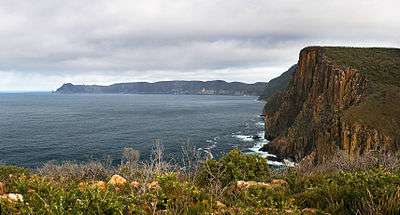Cape Pillar
Cape Pillar is a location in southern Tasmania, on the Tasman Peninsula in the Tasman National Park, adjacent to Tasman Island.

Cape Pillar seen from Cape Hauy track
It is notable as a coastal feature of the Dolerite landscape of the area.
It has been captured in illustrations as early as 1824 [1] and later [2][3]
It is the location of a rare casuarina Allocasuarina crassa.
It has been an area where whales have been sighted [4]
It is a reference point on the coast for mapping by Australian navy hydrographic service [5]
Notes
- LYCETT, Joseph (1824), Cape Pillar, near the entrance of the River Derwent, Van Diemen's Land, retrieved 1 June 2015
- Fergusson & Mitchell (Firm) (1851), Off Cape Pillar, LINC Tasmania, retrieved 1 June 2015
- Cape Pillar, LINC Tasmania, 1851, retrieved 1 June 2015
- "WHALES OFF CAPE PILLAR". The Mercury. Hobart, Tasmania. 18 November 1892. p. 2. Retrieved 1 June 2015 – via National Library of Australia.
- Australia. Royal Australian Navy. Hydrographic Service; Army Topographic Support Establishment (Australia) (1998), Australia – Tasmania, South East Cape to Cape Pillar, Hydrographic Service, R.A.N, retrieved 1 June 2015
| Wikimedia Commons has media related to Cape Pillar. |
gollark: I don't THINK so.
gollark: PETA will destroy you.
gollark: At least it has generics.
gollark: Oh, and it's not a special case as much as just annoying, but it's a compile error to not use a variable or import. Which I would find reasonable as a linter rule, but it makes quickly editing and testing bits of code more annoying.
gollark: As well as having special casing for stuff, it often is just pointlessly hostile to abstracting anything:- lol no generics- you literally cannot define a well-typed `min`/`max` function (like Lua has). Unless you do something weird like... implement an interface for that on all the builtin number types, and I don't know if it would let you do that.- no map/filter/reduce stuff- `if err != nil { return err }`- the recommended way to map over an array in parallel, if I remember right, is to run a goroutine for every element which does whatever task you want then adds the result to a shared "output" array, and use a WaitGroup thingy to wait for all the goroutines. This is a lot of boilerplate.
This article is issued from Wikipedia. The text is licensed under Creative Commons - Attribution - Sharealike. Additional terms may apply for the media files.